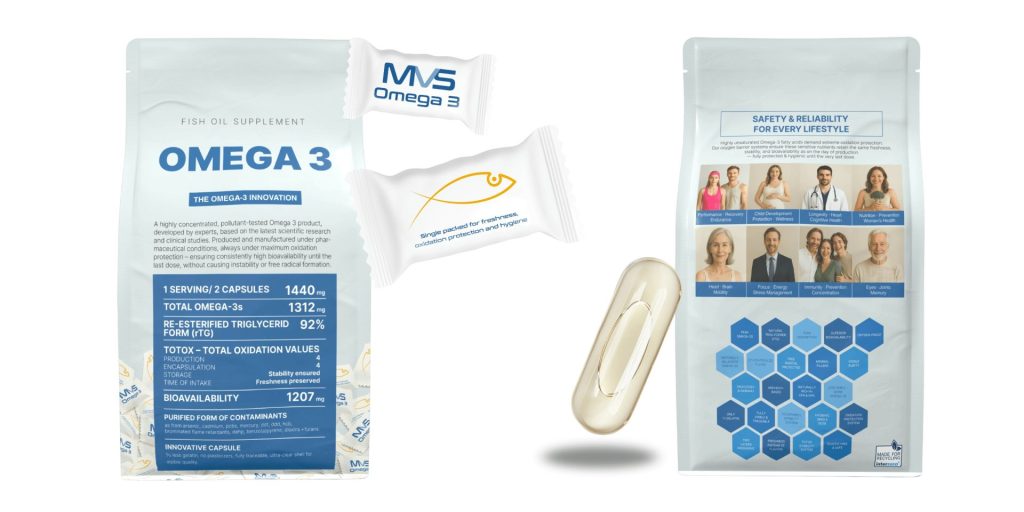Table of Contents
Introduction: Why Omega-3s Matter for Children Today
Every parent wants to give their child the best start in life — a strong body, a sharp mind, emotional resilience, and protection against illness. While balanced nutrition and physical activity form the foundation of children’s health, modern research has identified one nutrient as especially critical for growing bodies and minds: Omega-3 fatty acids.
Omega-3s — particularly EPA (eicosapentaenoic acid) and DHA (docosahexaenoic acid) — are essential for brain development, cognitive performance, mood regulation, eye health, and immune resilience. Yet most children today are not getting enough. Western diets are dominated by Omega-6 fats (vegetable oils, processed foods) that compete with Omega-3s, while fish consumption among kids remains low.

In 2025, with rising concerns around ADHD, anxiety, obesity, and early cognitive development, Omega-3s stand out as one of the most powerful and evidence-backed nutrients parents can provide.
This guide explores what Omega-3s are, why they are vital for children, how much kids really need, and how to choose the safest, most effective supplements.
What Are Omega-3 Fatty Acids?
Omega-3s are a family of essential fats — meaning the body cannot make enough on its own and they must come from food or supplements.
- ALA (Alpha-linolenic acid): Found in flax, chia, and walnuts. Conversion into EPA/DHA is inefficient (<5%).
- EPA (Eicosapentaenoic acid): Found in fish and algae. Helps regulate mood, behavior, and inflammation.
- DHA (Docosahexaenoic acid): Found in fish and algae. The most important Omega-3 for brain and eye development.
For kids, direct EPA and DHA intake is essential. ALA from plants alone isn’t enough to meet developmental needs.
Omega-3 Benefits for Children
- Brain Development & Cognitive Performance
- DHA: The Brain Builder
- The human brain is nearly 60% fat, and DHA is the dominant structural fat in the brain and retina.
- Adequate DHA intake during childhood supports memory, learning, concentration, and visual processing.
- ADHD & Focus
- Meta-analyses (2022–2024) show children with ADHD tend to have lower Omega-3 levels.
- Supplementation, especially with high-EPA oils, improved attention span, reading ability, and reduced hyperactivity in some children.
- Academic Performance
- Studies in school-aged children supplementing with 600–1000 mg DHA/EPA daily showed improved reading, spelling, and working memory.
- Parent takeaway: Omega-3s give children the neurological “building blocks” for learning, focus, and school success.
- DHA: The Brain Builder
- Emotional & Mental Health
- EPA helps regulate mood and reduce anxiety by balancing neurotransmitters like serotonin and dopamine.
- Clinical studies show Omega-3 supplementation supports emotional stability, reducing aggression, irritability, and mood swings in children.
- For adolescents, Omega-3s are linked to lower rates of depression and anxiety, offering natural support during stressful developmental years.
- Parent takeaway: Omega-3s support mental resilience — helping kids manage stress, emotions, and social challenges.
- Immune System & Inflammation
- Children face constant immune challenges at school and during play. Omega-3s:
- Strengthen immune regulation, reducing chronic inflammation.
- Lower risk of asthma and allergies by balancing inflammatory pathways.
- Improve resilience against frequent colds and infections.
- Parent takeaway: Omega-3s act like a “balancing system” for immunity — supporting defense without overstimulation.
- Growth & Physical Development
- Omega-3s play a role in bone health, working alongside calcium and vitamin D to improve bone density.
- Support muscle development and repair, especially in active children.
- Improve eye development and visual acuity, crucial for learning and sports.
- Parent takeaway: Omega-3s strengthen the physical foundation for growth, play, and learning.
- Additional Benefits for Children
- Sleep quality: Studies show children with higher Omega-3 levels sleep longer and wake less often.
- Skin & eczema: Omega-3s improve skin barrier function, reducing dryness and eczema symptoms.
- Weight management: Higher Omega-3 intake is linked to a lower risk of childhood obesity, as it improves fat metabolism.
How Much Omega-3 Do Kids Need? (2025 Guidelines)
General Recommendations by Age
- 1–3 years: ~100–250 mg/day EPA+DHA
- 4–8 years: ~250–500 mg/day
- 9–13 years: ~500–750 mg/day
- 14–18 years: ~750–1000 mg/day
For children with ADHD, anxiety, or high training loads (youth athletes), higher doses (1000–2000 mg/day, EPA-rich) may be recommended under medical guidance.
Food vs Supplements
| Source | Pros ✅ | Cons ❌ |
|---|---|---|
| Food (Fish, Algae, Nuts/Seeds) | – Fish provide protein, vitamin D, iodine, selenium along with Omega-3. – Algae = safe vegan/vegetarian DHA source. – Whole-food approach. | – Kids often don’t eat enough fish. – Some fish may contain mercury, PCBs, or microplastics. – Plant sources (ALA) convert poorly to DHA. – Intake is inconsistent week to week. |
| Supplements (Purified & Safe, like MVS Omega-3) | – Deliver measurable, consistent doses of EPA+DHA. – Purification removes heavy metals & toxins. – rTG form = best absorption. – Convenient, child-friendly capsules. – Freshness preserved with double packaging. | – Quality varies widely across brands. – Risk of rancidity if poorly packaged. – Must be chosen carefully for purity and safety. |
Parent takeaway: A mix of food + supplements works best. Supplements ensure consistency and safety where diet falls short.
Choosing the Right Omega-3 Supplement for Children
When selecting an Omega-3 supplement for kids, consider:
- Form: Look for re-esterified triglyceride (rTG) form → superior absorption compared to ethyl ester.
- Freshness: Low TOTOX oxidation values = safe, effective.
- Purity: Free from heavy metals, PCBs, and microplastics.
- Packaging: Double-protection (individually sealed capsules + oxygen-barrier pouch) ensures stability and no rancid taste.
- Taste: Naturally neutral oils don’t need lemon or flavoring to mask rancidity.
MVS Omega-3 — Setting a New Standard in Purity, Stability, and Bioavailability
Developed by MVS Pharma’s medical and pharmaceutical experts, MVS Omega-3 represents a new generation of scientifically designed Omega-3 supplements. With a 92% natural rTG structure, verified bioavailability of 1207 mg, and our proprietary T-TOX™ oxidation control system, it ensures exceptional purity, stability, and absorption. Each batch meets European Pharmacopeia standards and is tested for over 20 potential contaminants — setting a benchmark for transparency and trust in modern nutritional science.

Not all Omega-3 supplements are created equal. The more unsaturated and effective Omega-3 molecules become, the more sensitive they are to air exposure — making oxidation protection the single most critical factor for preserving both safety and bioavailability. Once oxidation begins, oil turns rancid, loses efficacy, and may even generate free radicals.
At MVS Pharma, this challenge defined our mission. We engineered MVS Omega-3 as a next-generation formulation designed for uncompromised purity, verified stability, and maximum biological usability.
Key Facts:
- Pharma-Standard Purification & Testing — each batch is verified to meet European Pharmacopeia standards and is screened for over 20 contaminants, including heavy metals, PCBs, dioxins, PAHs, and plasticizers.
- 90% Purified Omega-3 Concentration — delivering 1440 mg total oil with 1312 mg active Omega-3s (EPA 784 mg, DHA 518 mg) per serving.
- 92% Re-esterified Triglyceride (rTG) Form — structurally identical to natural fish oil for superior absorption (1207 mg bioavailable) and full physiological compatibility.
- T-TOX™ Total Oxidation Control System — exclusive German oxidation-management technology ensuring freshness and molecular integrity from production to the last capsule.
- Innovative Double Packaging — Individually Sealed Protection. Each capsule is individually sealed in an oxygen-free, double-wrapped container filled with argon gas. This advanced protective solution shields the sensitive Omega-3 oil from oxidation, light, and moisture — preserving the purity, stability, and freshness of each capsule until the very last dose.
- Ultra Thin Capsule Release 3.0™ — 2/3 less gelatin, no plasticizers, and >91% active ingredient load for transparency, purity, and optimized payload.
- Natural Tocopherol Matrix (α, β, γ, δ) — balanced antioxidant system calibrated to protect high-purity oil without destabilization.
The result is an ultra-pure, oxidation-protected Omega-3 supplement that maintains its natural structure, freshness, and full efficacy until the final dose — ensuring consistent support for cardiovascular, cognitive, visual, and immune health.
Summary: Why Omega-3s Are a Foundation for Children’s Health
In 2025, the evidence is undeniable: Omega-3s are one of the most important nutrients for children’s brain development, emotional resilience, immune strength, growth, and long-term health.
Yet most children are not getting enough through diet alone. By combining Omega-3-rich foods with high-quality, safe, and bioavailable supplements, parents can ensure their children get the support they need for learning, play, and growth.
Disclaimer: As a service to our readers, MVS Pharma GmbH publishing provides access to our library of archived content in our blog. Please note the date of the last review or update on all articles. No content on this site should ever be used as a substitute for direct medical advice from your doctor or other qualified clinician.
FAQs
They support brain development, learning, mood, immunity, and growth.
Not usually. Most kids don’t eat enough fish, and plant sources don’t convert efficiently to DHA.
One in rTG form, purified from contaminants, with low oxidation values and child-friendly packaging – such as MVS Omega-3.
Yes. High-EPA Omega-3s have shown benefits for focus, attention, and hyperactivity.
Between 100–1000 mg EPA+DHA, depending on age, higher in certain conditions under medical advice.
It offers oxidation resistance, superior absorption in rTG form, full safety testing, and double protection packaging — ensuring purity and potency from production to consumption.
Sources:
- National library of medicine – “Effects of Omega-3 Fatty Acids on Immune Cells”
- National library of medicine – “Beneficial Outcomes of Omega-6 and Omega-3 Polyunsaturated Fatty Acids on Human Health: An Update for 2021”
- National library of medicine – “IN TIME: IMPORTANCE OF OMEGA-3 IN CHILDREN’S NUTRITION”
- Medical News Today – “Omega-3 fatty acids are essential for healthy growth and development in children and are generally safe.”
- Mayoclinic – “Mayo Clinic Q and A: Omega-3 supplements for children — what does the research show?”
- The Guardian – “What your children should eat”


